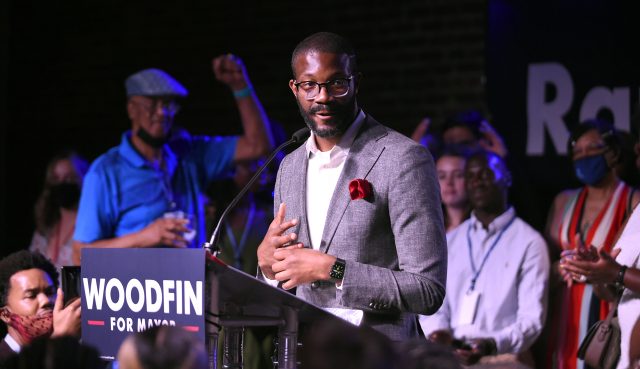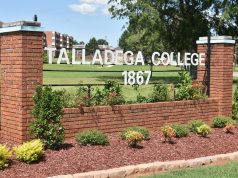
By Ryan Michaels
The Birmingham Times
As a student of politics, Birmingham Mayor Randall Woodfin isn’t often surprised by what happens in government. But even he admits there was something unexpected about his recent re-election victory to a second term as mayor where he captured 64 percent of the vote in a race with seven challengers.
The mayor said he was stunned by the totality of his August 24 victory, having won “every single precinct in the entire city.”
“It was never about what we wanted. It was always about what the people of Birmingham wanted,” Woodfin told The Birmingham Times on Tuesday in one of his first sit down post-election interviews. “Then we made their priorities our priorities, and we delivered on those priorities.”
In the 20-minute interview in the mayor’s office at city hall Woodfin took time to reflect on his victory but also look at some of the challenges he faces over the next four years.
The mayor said he ran a much different race during the campaign than his opponents, especially in tone.
“How we communicated in all our channels, not about only what we’ve done on [residents’] behalf, but Vision 2025, what we want to do over the next four [years], I think that was compelling, compared to my opponents, who only talked about things in a very negative way or were not truthful in some of the things they were communicating with the public,” Woodfin said.
The mayor said Vision 2025, his plan for the next four years, is focused on areas of utmost importance to residents including crime reduction and neighborhood revitalization.
Woodfin said the city has a “toolbox,” containing different implements to curb crime.
“In this toolbox, it can’t just be enforcement, so it can’t just be police presence, more police officers,” he said. “It can’t just be technology [like the] real time crime center and cameras, license plate readers. It has to be people who are in a community, who know [other] people who are susceptible to certain elements that may get them in harm or [enable them to] do the harm.”
The city should continue to make investments in conflict resolution as a “long-term play,” he said.
“When I’m talking about conflict resolution, I want our youngest generation to have full wraparound services, [which are] the combination of mental health services, conflict resolution and financial literacy,” Woodfin said. “Those are the things we have to do.”
Neighborhood revitalization is a result of business owners and government working together, he said.
“The truth is, [revitalization is] a public private partnership. You want the private sector, which I’m excited about the existing business owners in that area, who are doing the work,” Woodfin said. “We want to partner with them. How can the city help you revitalize your existing buildings? What commercial development industry you want to bring?”
The city has a support role to businesses in to-be-redeveloped neighborhoods, Woodfin said.
“The city’s role is to enhance, support and lend resources to the existing small business owners there and anybody else that wants to take a risk to come there and seek growth there. We do a part to assist them as well.”
Another key part of effectively revitalizing neighborhoods is bringing grocers to areas without access to healthy food, he said. Often, grocery store owners do not want to move into some “zip codes” because of projected losses of revenue due to low income or theft, he said.
“My question to them, as Mayor, on behalf of those citizens who live in that zip code, tell me what the financial gap is, and the city should get to a point of being comfortable to offset whatever that financial gap is to get that grocery store to…that zip code,” Woodfin explained, “because those citizens deserve healthy food options, no different than any other zip code in the city.”
When revitalization happens in a particular neighborhood, it often starts with a small number of “anchors,” Woodfin pointed out. For example, Avondale Park and Avondale Brewing Company serve as anchors for a developed portion of Avondale.
“[In] downtown Ensley, I believe, the [Ramsay-]McCormack building is an anchor,” Woodfin said, later adding, “We will leave, [as we move forward], [plots] of green space. There are some other [plots] that are city-owned, but we’ve got to get to McCormack first, which is underway. I think that needs to be supported by the partnership with the existing small business owners, and then we move out from there.”
Woodfin said the Birmingham Land Bank Authority (BLBA) is a way for current residents to improve their neighborhoods. He pointed out that the BLBA has a program which allows residents to purchase cheap lots adjacent to property they own.
“Buy the side lot, and you are now empowered to go vertical with this side lot, with a single-family home, or build a garden on this lot if you want, or maintain this lot, however you want it,” Woodfin said.
It’s important to focus on the current residents of neighborhoods being prioritized for revitalization. “Our intention is not for some outside investors just to come in here and look at an area and try to flip it,” Woodfin said. “It’s actually for the existing homeowners who have been taken care of their property, who do love their neighborhood to be involved.”
“Targeted Buyouts And Relocations”
Woodfin’s Vision 2025 plan also addresses “targeted buyouts and relocations” for North Birmingham residents who have been living with poor environmental conditions. In neighborhoods like Collegeville and Fairmont, residents have dealt with pollution for years.
“This area is not just about organizations who made this area bad from a respiratory health, being able to breathe and causing cancers standpoint,” Woodfin said. “You’re talking about an area that’s literally surrounded by industry, surrounded by train tracks on all sides and is in a floodplain.”
Woodfin, who has had family in Collegeville all his life, also said the city is responsible to those residents who don’t want to relocate.
“Everybody doesn’t want to leave,” the mayor said, “but we’ve got to make sure for the people that want to stay and those families that lived here…we’re doing everything we can to take care of those families to make sure their quality of life gets better.”
Overall, Woodfin said the city is “on the right track.”
“Is everything perfect? No, but we want to remind citizens in Birmingham, there’s a lot of good here,” he said, “and we want to encourage people to come participate in your municipal government don’t sit back and just point the finger. Join us as we continue to move Birmingham forward.”




